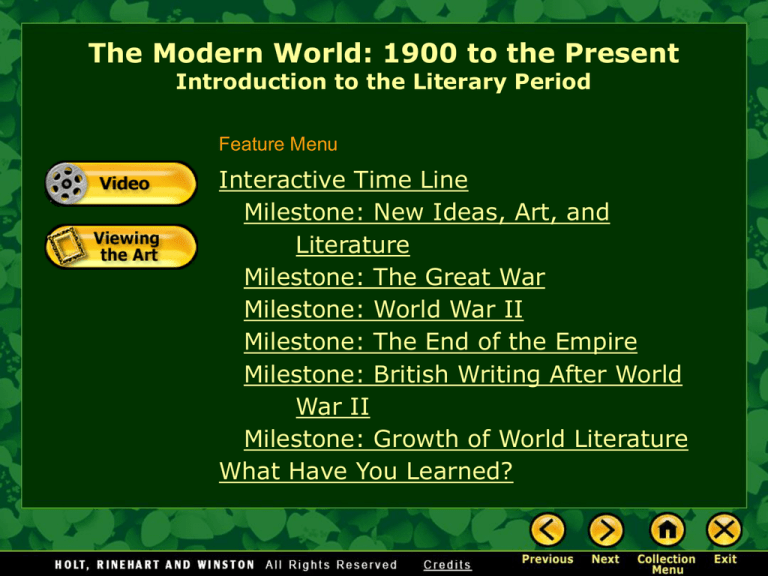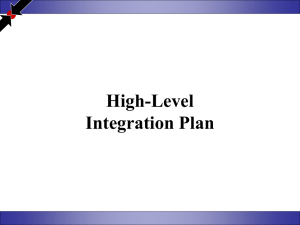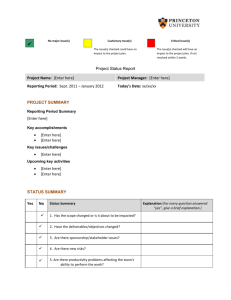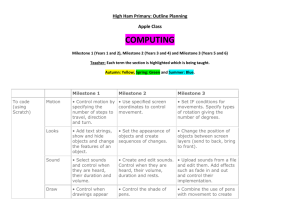The Modern World 1900
advertisement

The Modern World: 1900 to the Present Introduction to the Literary Period Feature Menu Interactive Time Line Milestone: New Ideas, Art, and Literature Milestone: The Great War Milestone: World War II Milestone: The End of the Empire Milestone: British Writing After World War II Milestone: Growth of World Literature What Have You Learned? The Modern World: 1900 to the Present Choose a link on the time line to go to a milestone. 1914–1918 The Great War 1900 1925 Early 1900s New Ideas, Art, and Literature 1939–1945 World War II 1940s–1950s End of the Empire 1950 1975 1960s– British Writing After World War II 2000 Late 1900s– Growth of World Literature New Ideas, Art, and Literature New Ideas in Science—Charles Darwin Origin of Species (1859) • theory of evolution based on natural selection • sparked debate over evolution versus creationism Social Darwinism New Ideas, Art, and Literature New Ideas in Politics—Karl Marx German philosopher and economist; lived in London Das Kapital (1867) • traced economic injustices to capitalism • said workers should own means of production • advocated doing away with private property New Ideas, Art, and Literature New Ideas in Psychology—Sigmund Freud Freud found motives for human behavior in the unconscious—an irrational and sexually driven realm • Conservative Victorians outraged by Freud’s claims • Many writers and artists intrigued by notion of unconscious New Ideas, Art, and Literature Experimentation in the Arts Henri Matisse and other French painters • Bold new use of lines and colors • Called les fauves (the wild beasts) Igor Stravinsky • Ballet The Rite of Spring—primitive rhythms and dissonant harmonies; riot at première New Ideas, Art, and Literature A Revolution in Literature James Joyce • New ways of exploring myth and symbol, sexuality, time, human consciousness • Ulysses—very controversial in 1922 Virginia Woolf • rejected traditional chronological order • experimented with novelistic structure, point of view, stream of consciousness The Great War World War I (1914–1918) Allied Forces—Great Britain, France, Russia Central Powers—Germany, Austria-Hungary Costs to Great Britain: • Tremendous loss of life • Weakened economy • Tottering colonial empire • Disillusionment, cynicism World War II Causes of World War II • Failure of the League of Nations • Worldwide economic depression • Rise of totalitarianism leading to development of fascism World War II Fascism Fascism is a government that is rigidly nationalistic, ruled by a dictator who wields absolute power backed by force. Germany: Adolf Hitler Italy: Benito Mussolini Russia: Joseph Stalin World War II Japan • Ally of Germany and Italy • Entire city of Hiroshima wiped out by a single atomic bomb dropped from an American plane on August 6, 1945 • End of war with Japan World War II 1941: Germany defeats France 1945: Allies defeat Germany and Japan Click to hear words of Prime Minister Winston Churchill (June 1940). Responses to War and Oppression Primo Levi Yasunari Kawabata Ha Jin • Italian • was interned at Auschwitz • depicted personal trauma of the Holocaust • Japanese • evokes loss and pain of civilians during WW II in “The Silver FiftySen Pieces” • Chinese • explores unequal relationships between the state and the individual The End of the Empire Before World War II . . . Australia, Canada, and South Africa separate from British Empire. Late 1940s through 1960s . . . • Most remaining colonies, including India, gain independence. • Newly independent nations begin to assert their own identities. Mohandas K. Gandhi British Writing After World War II Angry Young Men—criticized pretensions of intellectuals, bland lives of middle class Kingsley Amis—Lucky Jim (1953), satirical novel about university life Postmodernism—term applied to many works written since World War II Deals with women’s rights, multiculturalism, environment, nuclear destruction The Growth of World Literature Postcolonial Literature Writers from former British colonies • explore issues of personal identity and effects of cultural domination • often feel obligated to write in English The Growth of World Literature Women’s Voices Feminist writers dramatize women’s lack of power in a world controlled by men. What Have You Learned? Choose the word that correctly completes the sentence. 1. Twentieth-century artists were most concerned with _____ . a. tradition c. experimentation b. the beauty of nature d. social reform 2. The 1900s embraced new ideas in _____. a. science c. psychology b. economics d. d. all all of of the the above above 3. After World War I the British people were _____. a. triumphant b. disillusioned c. power hungry END




